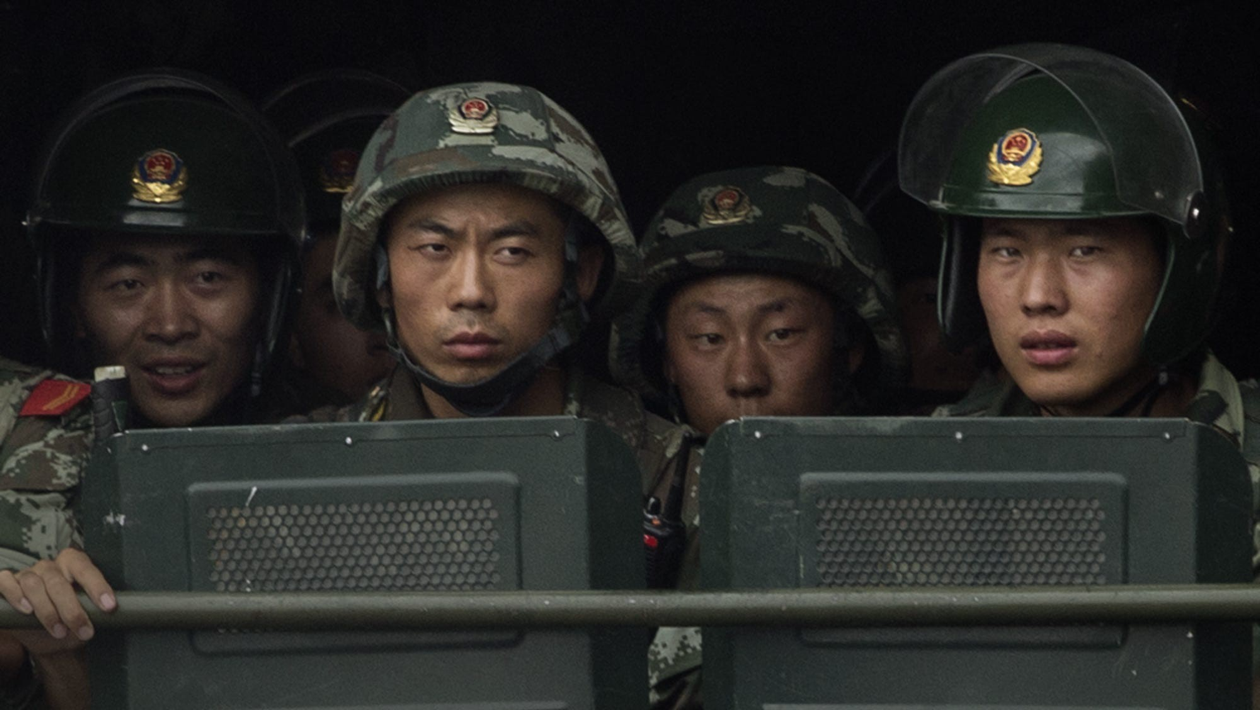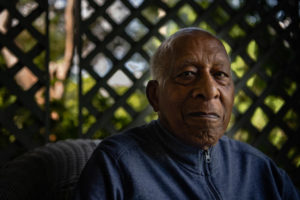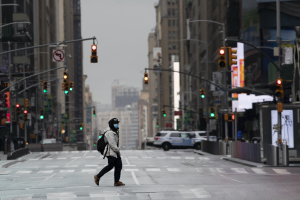WASHINGTON – The U.S. and China are engaged in an increasingly intense confrontation over Beijing’s human rights record – exchanging near-daily salvos over allegations Xi Jinping’s government is committing genocide against the Uyghur people.
The State Department announced new sanctions last week against two Chinese officials it said were directly involved in abuses against the Uyghurs, and Secretary of State Antony Blinken has said he would consider banning Chinese imports made by the Uyghurs with forced labor. At his first solo news conference, President Joe Biden vowed to be “unrelenting” in calling attention to China’s human rights abuses.
The Biden administration formalized its accusations that China has engaged in “genocide and crimes against humanity” on Tuesday as part of an annual State Department human rights report. The document cites Beijing’s “mass detention” of the Uyghurs, as well as evidence of forced sterilization, rape, torture and forced labor.
Some American Uyghurs have expressed new hope the U.S. will lead a global campaign to stop China’s campaign against their people.
“The tide is turning,” said Nury Turkel, a foreign policy expert and human rights advocate with the Hudson Institute, who himself was born in a re-education camp during China’s cultural revolution.
But China is pushing back hard, accusing the U.S. of meddling in China’s internal affairs and blasting the genocide label as a fabrication of Western researchers and biased foreign media outlets.
“These anti-China forces act in collusion with each other and have staged disgusting and ridiculed farces,” Sun Zhen, an official with China’s foreign ministry, said at a March 20 press conference.
Here’s what you need to know:
Who are the Uyghurs?
The Uyghurs are a predominantly Muslim ethnic minority who live in what China refers to as the Xinjiang region, but what some Uyghurs call East Turkestan. There are an estimated 11 million Uyghurs in Xinjiang,a large patch of land in western China that shares a border with Pakistan, Kazakhstan and. The Uyghurs speak a Turkic language and have a different cultural identity than the Han Chinese population, which speaks Mandarin and is generally not religious.
The Chinese Communist government views the Uyghurs as a threat in part because some have sought greater autonomy or even a separate state. Chinese government officials allege there are extremists within the Uyghur community and have said their campaign to “re-educate” the Uyghurs is justified by terrorism concerns.
In May 2014, the Chinese government launched what it called the “Strike Hard Campaign against Violent Terrorism” in Xinjiang, which included a dramatic expansion of surveillance of the Uyghurs and a harsh crackdown on their movement and communication, according to a legal opinion issued in February by a British law firm on behalf of Uyghur human rights groups. The opinion, written by attorneys with Essex Court Chambers, concludes there is a “credible case” that China’s treatment of the Uyghur people amounts to “crimes against humanity and the crime of genocide.”
‘Fundamentally at odds’: Blinken, China meeting got heated in Alaska
Chinese officials reject such accusations. They have dismissed media reports about mass detentions, rape, forced sterilization and other abuses as biased and fabricated.
“China is not doing these things. And it’s very unfortunate some people, including some journalists, they start with very strong bias and prejudice,” China’s ambassador to the U.S., Cui Tiankai, told CNN in a March 25 interview.
Cui said China’s campaign was spurred by a “mounting terrorist, extremist and violent ideology among the local population.” Skeptics say there is little credible evidence to support the terrorism allegation.
Uyghurs are being detained in camps and prisons
Media outlets and researchers have used satellite images to map the Chinese government’s network of camps and prisons. Experts with the Australian Strategic Policy Institute have identified at least 380 detention facilities in Xinjiang that have been newly built or expanded since 2017. Some estimates put the number of detention facilities as high as 1,400.
The human rights group Amnesty International estimates at least 1 million Uyghurs have been “arbitrarily detained” in these facilities for what China calls its “transformation-through-education” effort in Xinjiang.
The State Department report says China has engaged in “mass detention” of more than 1 million Uyghurs and other minorities, and the government has subjected another 2 million people in Xinjiang to “re-education” training in less severe settings.
Human rights: Blinken blasts the Trump administration’s ‘unbalanced’ emphasis on religious liberty over other human rights
Human rights groups say the Uyghurs have been put in the camps for a variety of reasons, from attending religious ceremonies, wearing a veil or having a beard, or refusing to marry a non-Uyghur. Starting in 2017, the local government in Xinjiang began criminalizing “virtually all Islamic matters,” according to an extensive report by a Washington-based think tank called the Newlines Institute for Strategy and Policy and the Raoul Wallenberg Centre for Human Rights, a consortium based in Canada.
The report, based on interviews with former detainees and other evidence, concluded China bears responsibility “for an ongoing genocide against the Uyghurs” and has breached key elements of the 1948 Genocide Convention with its “intent to destroy” an entire ethnic group.
President Joe Biden: Chinese President Xi Jinping doesn’t have ‘a democratic … bone in his body’
Chinese officials have singled out one researcher in particularly harsh terms: Adrian Zenz, a German scholar who now lives in the U.S. and is a senior fellow for China studies at a group called the Victims of Communism Memorial Foundation. The foundation’s spokesperson did not respond to a request for an interview with Zenz.
During a March 20 press conference, Chinese Communist Party officials said his reports were “full of lies and fake information,” among other attacks. He is “a goon fed by anti-China forces,” said Sun, the foreign ministry official.
‘Vocational centers’ or ‘concentration camps’?
Chinese officials say the facilities in Xinjiang are not prisons, but rather “re-education” centers aimed at “de-extremification.” They argue the facilities provide Uyghurs with vocational skills, recreational activities, medical services and a host of other benefits. They also say the Uyghurs are allowed to “return home regularly.”
But media reports and independent research shows that in the internment camps, Uyghurs are indoctrinated on the “backwardness” of their identity and subjected to a wide range of mental, physical and sexual abuses. They are forced to recite Chinese Communist Party propaganda and renounce Muslim religious practices.
“Being an Uyghur is a crime,” one camp guard told a detainee, according to the Newlines’ report. In another instance, a detainee was told, “you don’t look like a human,” after being raped and struck by an electroshock prod, the report says.
The researchers also cite Chinese government documents which list prison supplies used to control the detainees. Among the items: electric cattle prods, Tasers, spiked clubs known as “wolf’s teeth,” pepper spray and handcuffs.
Airbnb: Airbnb asked to drop Olympic ties over China rights issues
‘Birth prevention’ campaign
According to media reports and independent researchers, Chinese officials have engaged in a forced sterilization effort targeting Uyghur women living in certain regions.
“Government documents from 2019 demonstrate plans for a campaign of mass female sterilization in rural Uyghur regions, targeting 14 and 34 percent of all married women of childbearing age in two Uyghur counties in that year alone,” the Newlines report states. In one district, the percentage of women who were infertile increased by 124% between 2017 and 2018, according to the think tank’s data.
Reports suggest the same is occurring inside the detention facilities. In February, the BBC published a story detailing systematic rape and torture of detainees with accounts from former detainees. The Newlines report says a number of former female detainees testified about being forcibly fitted with IUDs while in detention.
Genz and other researchers say the detention centers are part of a broader birth prevention strategy, noting many of those locked up are of child-bearing age.
Beijing Olympics: What drives possible boycott of Beijing Olympics
As with other accusations related to the Uyghurs, Chinese officials dismiss these accounts as false. At the March 20 event, Mahmut Abduwali, an associate researcher with Xinjiang Academy of Social Sciences, cited China’s country-wide family planning policies in countering Genz’s research. China implemented its “one-child policy” in 1979 to limit the country’s population growth, a campaign Beijing ended in 2015.
“The implementation of family planning policy in China has experienced an orderly process,” Abduwali said. “It first started in the inland provinces and then moved to the frontier provinces, in the urban area first and then to the rural area, and on the Han population first and and then on the ethnic minorities.”
But the Newlines report says it is part of a concerted strategy to destroy the Uyghurs.
“In the camps, Uyghur women are subjected to forced IUD insertions, abortions, and injections or medication halting their menstrual cycles, while Uyghur men of childbearing age are targeted for internment, depriving the Uyghur population of the ability to reproduce,” the report says.
“As a result of these interconnected policies, growth rates in Uyghur-concentrated areas are increasingly approaching zero.”
China has also clamped down on Hong Kong and Tibet
While China’s persecution of the Uyghurs stands out in scope and severity, Xi’s government has also ramped up other types of repression.
Last year, China imposed a “national security” law on Hong Kong and used the statute’s sweeping powers to conduct mass arrests of protesters and regime critics. Now, Chinese officials have dramatically curbed free, direct elections in Hong Kong.
Beijing also maintains an iron grip on Tibet, where Xi has escalated a campaign to stamp out the region’s identity and culture through “re-educational patriotism.”
The State Department’s human rights report says China has been monitoring and disrupting telephone and internet communications in both Tibet and Xinjiang. The government installed surveillance cameras inside Tibetan monasteries, the report says, and has used a broader surveillance network to intimidate political dissidents, religious leaders and individual Tibetans and Uyghurs.




